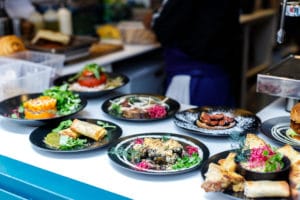The Chef’s Need
Today, the reality is that Top Chefs do not express any need in terms of plant-based cuisine. For the most part, they do not offer a plant-based menu and are fine with it.
Some say they do not want to do otherwise, for practical and economic reasons. Some assume that they simply do not know how to do it, due to a lack of training or knowledge in the matter.
Others know how to do, are curious and dare to offer 100% plant-based novelties. But even though they have done most of the work, they resist communicating or do not clearly display their offer, confusing customers a bit.
Still others, after having made a clear and assumed offer, discreetly withdraw after a while.
These inequalities reflect the state of mind of these Chefs who are lost concerning this new gastronomy. However, as long as the Chefs are lost, so are the customers.
As for the Vegan Chefs, it’s quite another thing. They are self-taught, have practiced plant-based cooking a lot, are ahead of the game and have learned new techniques to give traditional cuisine its plant-based alternative.
What they do is good, beautiful and in line with “French” gastronomy. It is innovative and appeals to a growing number of people.
While the knowledge and skills of each could be brought together to reflect on the challenges of tomorrow, Traditional Chefs and Vegan Chefs are still too much each in their own corner and do not join forces enough to learn from each other.
Today, in fact, the Top Chefs do not express this need, but it is important to anticipate it because it is indeed there.
Chefs’s feelings
When the subject of plants comes up, the feelings of the Chefs also vary.
Chefs who are not really interested in it are pretty much in their corner. In this case, it is still important to show them what it would bring them to take an interest in it. Get them to see things differently in order to develop their profession by learning new techniques, new knowledge …
For Chefs who are aware of the matter but still have doubts, they would certainly need to know where to start. In this case, it would be enough to put them in touch with the right people, to accompany them with reassuring peers to gently initiate the subject.
As far as Vegan Chefs are concerned, many of them work mainly in B2C (Business to Consumer) and do not necessarily have the opportunity to be in contact with Top Chefs yet. However, it would be important for them to meet more of these Top Chefs and talk to them about the way they do business. Exposing themselves and making themselves visible, to show and give a taste of what they do, to arouse feeling…
The role of Chefs
The profession of a Chef is far from simple. Today, a Chef must be passionate, creative, while at the same time being a business leader, manager and communicator … Obviously, not everyone has the means to be all of this at the same time. But this profession leads to adapting and questioning oneself throughout life and as our society changes, because eating is a necessity and we can’t close our eyes to the impact of our way we eat today.
While we are questioning the future of human nutrition by 2050, plant-based food is certainly one of the solutions. Veganism is not a fashion or a trend but a real philosophy of life that questions our way of consuming and eating. A lever that could prove invaluable for these Chefs who are questioning themselves.
The Top Chefs are the guarantors of French gastronomy, able to pass on the right messages to the general public, so it is through them that food change is possible. They have a role to play in educating the general public, but they still need to know the subject well enough and want to take on this role.
What are we afraid of?
When it comes to doing something new, of changing things… there are many fears. Stepping out of our comfort zone causes us to question our power of mastery and control, and that is quite uncomfortable. Our fears of failure, of changing benchmarks… push us to remain in our certainties without asking questions.
But isn’t it more rewarding for ourselves and for others to learn to do things differently? Dare to push open new doors and accept that we can make mistakes.
So why not just give it a try. The only risk I see is that it works beyond our expectations and that we (finally) become the real actors of tomorrow’s gastronomy.
Translated by Malvika Kathpal





